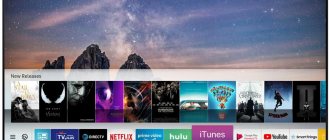What is Smart TV in a modern TV?
Smart TV is a technology that has made it possible to use the Internet on TVs, as well as games and various applications. Allows you to communicate on social networks, listen to music, open applications to watch video content and do everything that people are used to doing on smartphones, only on a big screen.
At the moment, you can buy a TV even from the middle price segment and it will have the same Smart TV technology as the expensive ones. Of course, they themselves will be of lower quality than premium, but the fact that they have development makes them already good options for purchase.
In a regular device (without Smart TV), the functionality is very limited: you can only watch the content shown by federal channels, you have to “catch” the showing time of your favorite TV show and wait until the advertising ends.
The main difference between a regular TV and a Smart TV is that when using the new technology, you can watch absolutely any content at a convenient time via YouTube, Netflix, or even go to the TV channel’s website and watch what you missed.
Smart models are much newer than ordinary devices and more advanced developments are used in their creation. This directly affects the screen resolution, the quality of the built-in speaker system and the overall appearance of the equipment.
What to choose: Smart TV or LED screen
Does a Smart TV need a Smart TV, since a regular ice screen is cheaper in price, and how else can Smart TVs and Ice TVs differ from each other? The ice screen is intended only for watching regular TV shows, but it is equipped with many connectors, so you can connect a computer to it to access the Internet.
Another advantage of Smart TV is that there is no need for a person to work with a keyboard. They simply use the remote control, and if desired, you can turn it on directly on the screen; they also control such a keyboard from a distance. A TV with smart TV function can be easily configured for different applications, for example, YouTube or Megogo. This will make it possible to switch to the service and quickly find the movie or series you need.
So it turned out that the main purpose of smart TV is its following functions:
- it replaces a computer, video camera and other home devices;
- provides an opportunity to access social networks;
- use applications of sites that store movies installed on Smart TV;
- installation of new applications that expand the capabilities of the television receiver.
What operating systems are used by Smart TV manufacturers?
There are 3 main types of OS that manufacturers use in their developments. Each of them is used in certain companies.
Tizen
This system was developed by Samsung and is popular. Its advantages:
- convenient and simple menu;
- remote control of the TV (voice, gestures, face recognition);
- full use of the potential of the device, as it was developed for it;
- transferring data from other Samsung equipment;
- access to applications and games;
- support from many providers.
WebOS from LG
Developed by LG. Has the following advantages over competitors:
- quick search for information;
- each action is accompanied by hints;
- simplicity of interface and operation;
- voice control.
Android
A system familiar to everyone. It is often used by Sony and TLC. Has its advantages:
- interface that is familiar to many;
- a large number of applications adapted for the OS;
- access to your game accounts through an account.
Speaking about which operating system is more functional, we can highlight Android. It is this OS that allows you to use maximum capabilities: there are a huge number of applications, the TV turns into a multifunctional device.
However, the first 2 systems are also not bad: they are better optimized for TVs and work faster.
Smart TV features
The main point of buying a Smart TV is the availability of functionality that is special from simple devices. Among them, it is worth mentioning television control.
The Smart device market offers a wide selection of equipment control, depending on the model. Many TVs can already sense voice and gestures. And the most modern ones can recognize faces and control them using a smartphone through special applications.
Control is not the only possible function. Let's figure out what this technology offers and what the scale of its capabilities is.
Viewing video files
You can connect external media to your Smart TV and view images on the screen. Devices with the Samsung operating system are simpler: there is no need to connect wires, you can simply connect the phone to the TV over the network and watch the information stored in the phone on the big screen.
Recording programs
Modern Smart TVs provide a screen recording function during the broadcast of a certain TV show. This development can be useful if there is a risk of missing your favorite program. It records video content and allows you to view it at any convenient time.
Conventional TVs for the most part do not have this capability, with rare exceptions. Either on a Smart device or on a regular one, recording a program is easy in a few steps:
- Take a flash drive formatted via Smart HUB.
- Open the menu.
- Select "Record".
- If recording is finished, click Stop Recording.
Internet connection
Only Smart TV can be connected to the Internet. A simple TV does not need an Internet connection, because it does not have access to social networks and browsers.
To get online, you need to either connect a special cable from any Internet provider, or do it using Wi-Fi, which distributes a signal to all devices nearby. In this case, the connection will occur automatically if the access point does not have a password. If there is a password, you will have to enter it.
Visual instructions on how to connect your TV to the Internet. Connections via Wi-Fi and cable are described:
games and applications
Smart TV provides a gallery of games and applications. Every gamer's dream has come true: you can play on a big screen with good graphics and sound. Many games are no different from the usual computer games.
Due to the fact that this feature has found a great response from users, manufacturers are interested in constantly adding built-in games. In order to take advantage of this opportunity, just connect to the Internet, go to the menu and open a window with games.
3D function
Many equipment manufacturers have begun to refuse to add 3D functionality to their designs. Reason: there was not enough demand for it. Such models have never been particularly popular and little content is produced for 3D. Therefore, over time, experts began to remove this function.
However, Smart models that support 3D remain on the market. They come across quite rarely, but in some large stores they can be found in considerable quantities. As a rule, these models are from the high price segment.
Do you need a Smart TV?
Smart TV technology, which appeared several years ago, is now being implemented in many devices - primarily in televisions. What is it for?
Save and read later -
Simply put, Smart TV delivers entertainment services to the consumer without using a computer or tablet: you can buy, listen and watch audiovisual content online, use social networks, run applications (mostly free) and play a variety of games. There are also special kits for entertaining children (for example, toy “motorcycles” or “tennis rackets”).
The main difference between Smart TV and a TV in its traditional sense is that you choose the content you want to watch or listen to. It can be delivered to your device either using branded applications (transmitting specific TV channels or broadcasts in general), or in the form of individual films and TV programs. The latest service is called “Video-on-demand” and also makes it possible to record broadcasts in real time. All this allows you to do not only without the traditional connection to a common house antenna, but also without pay cable television.
Smart TV on TVs from various manufacturers is based on one of four platforms: Android, Firefox OS, Samsung Tizen and LG webOS. But this does not mean that you will have to understand the pros and cons of this or that solution: the content is generally unified, and you will only have to deal with the multifunction remote control and information on the TV screen without the headache of “which OS to choose” (as opposed to from smartphones, for example).
In addition to TVs, Smart TV is available in certain set-top boxes (including game consoles), receivers, Blu-Ray players, and to connect to the service you need a dedicated channel with a width of at least 5 Mbit/sec.
So, what are the pros and cons of this technology in the eyes of the average viewer and listener?
Pros of Smart TV
- Purchase, record and play only the content you need;
- Ample opportunities that allow you not to be limited to movies and music: you have access to tens of thousands of high-quality videos on YouTube and online radio stations, full surfing in the browser, clients for various social networks, Internet telephony, games and much more. In addition, you can connect a computer via a wireless protocol and transfer data from it.
- If you purchase a set-top box based on the Google Android OS, you will additionally have access to content from the Google Play Store: many of the million-plus applications (most of which are free), mapping tools, learning systems, office applications for working with documents, and even GMail. However, not all consoles support this: it needs to be clarified in each case separately.
- You can connect a keyboard or mouse, as well as other controllers: thus, the convenience of consuming content is significantly expanded and opportunities for creating it (the same documents) appear.
- Finally, unlike similar technologies that developed and are developing in parallel (for example, HbbTV or Apple TV), Smart TV has a great future: more and more TVs and set-top boxes are equipped with this function, applications are being released in large numbers, and no decline is even visible in the long term. For the buyer, this means that a year or two after purchase, the set-top box or TV will not become useless due to a “fundamentally new round of technology development” or fashion. Smart TV is here to stay, as they say, for many years to come.
Cons of Smart TV
- In essence, the capabilities of Smart TV are similar to a regular LCD TV with a connected computer and network card, but in a stripped-down form: mainly entertainment content is left.
- The variety of applications and capabilities in a particular model still depends on the whim of the manufacturer. For example, a laser pointer with a gyroscope is integrated into the remote control of new Samsung TVs, which allows you to control what is happening on the screen with a wave of your hand. Only individual set-top boxes are more or less unified - but here you need to think about the operating system, because the capabilities depend on it.
Conclusion
If you already have a modern TV without Smart TV capabilities, then it makes no sense to buy a new “almost the same” one: you just need to get the appropriate set-top box, either separately or as part of a game console/Blu-Ray player.
But if you're buying a new TV, think about the capabilities this technology offers (and most of them are already included in the price of the TV itself), especially how it enhances the capabilities compared to traditional, "terrestrial" broadcasting: you get both much more than anything else.
Arthur Loyanich, "Audiomania"
This article has been read 59,232 times.
The article is included in the sections:
Useful tips
Advantages and disadvantages of devices with Smart TV
Even the newest and most advanced technology has not only pros, but also cons. Experts believe that Smart TV is the future. However, there is room for improvement and room for growth.
Advantages:
- higher quality than conventional TVs;
- thinness and lightness (new devices are much more compact than their predecessors);
- connection to the Internet, like in a smartphone;
- presence of a large number of connectors;
- multifunctional control, no need to have the remote control nearby;
- easily recognized and understood by people who are not technically strong;
- stronger and more reliable than a regular TV.
Flaws:
- Most Smart TVs are much more expensive than regular TVs. Of course, there are models that are included in the middle price segment and do not require large expenses. But, in the context of comparison, this difference will be noticeable.
- Some video formats may not play on your device.
Disadvantages of Smart TV
Alas, every barrel of honey has its fly in the ointment. This fate also did not escape smart TVs:
1. In the lion's share of devices, the OS becomes outdated after 2-3 years from the start of operation . And if this is not sensitive in phones, then televisions are usually purchased for 5-10 years.
2. Cut-down versions of applications Not every smart TV can compare in hardware quality to a tablet, so the functions of programs are often cut down.
3. Tracking the user's web history Without authorization, some smart functions are not available here, and with it, TV collects the user's preferences to display advertising.
4. High price A good smart TV is more expensive than a conventional “box”.
Topic: How to set up Smart TV yourself: 2 ways
Features when using gadgets, storage devices, external devices in Smart TV
The main feature of using gadgets and external devices in Smart TV is convenience and speed. A regular TV cannot boast of these characteristics. You can't transfer anything from your phone to such a device.
New technology has made life much easier and made it possible to carry out most transactions online. You can quickly transfer the necessary information to the TV and back. Smart TV also has USB connectors. You can connect memory cards, flash drives and other external devices.










